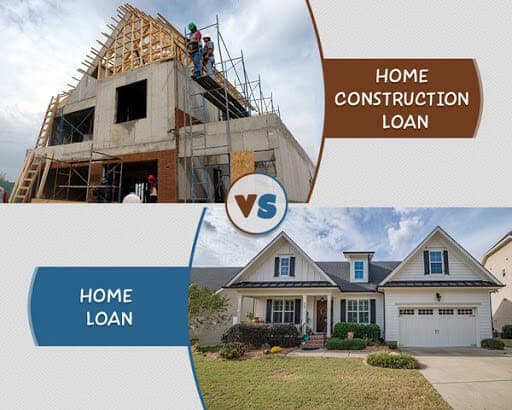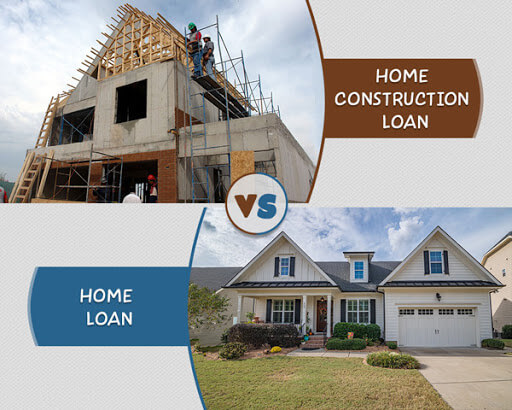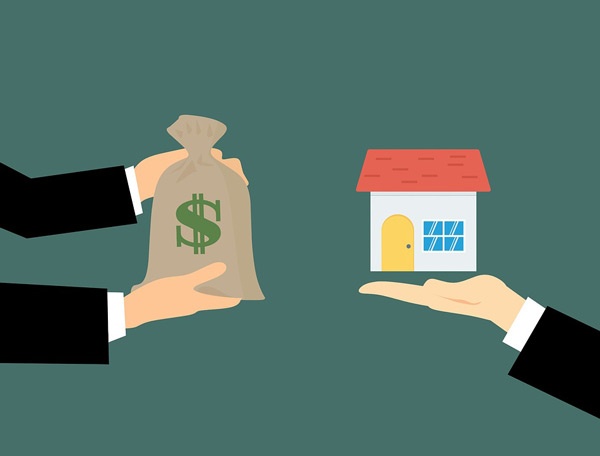
Buying a home or developing a home is one of the innate desires of humans and availing financial assistance from the banks or leading financial institutions helps in this process. The retail banking help for buying a property or developing a property is generally called home loan. Mainly two types of home loans you may avail provided you have the eligibility: one is home loan and the other is termed as the home construction loan.
Home loan is used for buying a house/a readymade property from a developer/a home owner. Alternatively, someone can construct a new house or modify an existing property. In both the cases, financial loan is available but for buying a home you need to have a home loan, while for constructing a house you need a home construction loan. Now is there any difference between home construction loan and home loan?
In order to understand the nuances of these two loan modules that can help you to fulfil your dream of making a home of your own, let’s study home Construction loan vs. home loan. The study will help you to understand how these two loans work and you can buy the right loan module that fits your need.

Differences between a Home Construction Loan and Home Loan
01. Meaning
As the name deciphers, a Home Construction Loan is also known as the self-build loan. It is a type of loan provided by financial institutions and banks for providing financial help for construction of a house while Home Loan is a loan provided by financial institutions and bank for purchasing a house (which is already constructed or partly constructed) by a developer with reliable profile.
In case of the home construction loan, the construction is generally carried out by the owner on the land already owned by him by engaging an architect and a contractor. Once he buys the land, the designing and execution of the complete construction of the house takes lots of time. While in case of a readymade house or even a house under builder’s scheme of construction, the person buys either the house readymade, or an existing property from its legal owner.
02. Period of Tenure: home Construction loan vs. home loan
Home Construction Loan is available for a short period generally around a year to 15 years while Home Loan with Home Insurance can be availed for a maximum tenure of 25-30 years. Due to a shorter period of loan tenure, the EMI’S of Home Construction Loan is found considerably higher than usual Home Loan EMI’ S.
03. Detailed Planning Requirements
To avail a Home Loan, one is not required to submit the lender the detailed planning of the construction while for availing a House Construction Loan the borrower needs to submit detailed planning of construction such as expected completion time, plan, elevation, drawings, estimate of cost of construction, repayment plan etc. (Any variations from the approved plans are excluded and in order to include the variations the borrower will require additional approval).
04. Loan Disbursal (hand out) Process

In case of home loan, the whole loan amount is mostly disbursed at once to the borrower as soon as the necessary property completion report is submitted, while for Home Construction Loan the loan disbursement process is done usually in instalments. The number of phases may vary from 2 to 5 depending upon the factors like the amount of loan, Loan to Value/cost ratio (LTV), (in other word margins), the tentative period for the project, i.e. time of completion, the progress rate of the project, etc. The lender mostly keeps an eye on the construction process and the disbursal may be affected if it is observed that construction is not moving forward.
Apart from this, in case of home loan you may have to pay Pre-EMI until the final amount of the sanctioned loan is disbursed. This indicates that the borrower has to pay an interest for the amount that is disbursed under each instalment and this amount will not be counted toward the repayment of the principal loan amount, which means even if you have started paying, you are not repaying toward the borrowed amounts. This brings the burden of additional expense.
05. Rate of Interest

The interest rates for Home Construction Loan are usually higher than that of a Home Loan. There are multiple reasons for this difference, including the fact that almost all banks and the financial institutions provide Home Loans, so the rate of interest here is very competitive while the number of NBFCs and banks providing Home Construction Loan are somehow limited in number. Home Loan interest rates range from 8.5% to 12% per annum in India, while Home Construction Loan interest ranges from 11% to 14%. Banks may provide loan on a “Floating Interest Rate”(It is current interest rate prevailing in the market and it is the subject to change if the RBI lending rate gets changed) and keeps varying during the entire loan repayment period based on the latest prime lending rates. The rate of interest also varies depending on an individual’s credit history and financial profile. People with lower Loan to Value ratio (LTV) may get interest at a lower rate (LTV simply shows the ratio of loan against the property value).
06. Loan Ratio
In case of a Home Loan, the maximum loan to cost ratio can be 90% considering the fact that the value of the house is lower than 30 lakhs. In case, the value of a house is more than 30 lakhs, the ratio of the loan will be slightly lesser. Generally, for Home Loans, a maximum amount of 80% of the market value of the property can be availed. While in Home Construction Loan, the maximum loan amount will be around 70%.
07. Down Payment

For a Home Loan, a down payment of 10 to 20% of the total property value is required, and for the rest, a loan can be availed while for Home Construction Loan a minimum down payment of more than 25% of the opted loan amount is required.
08. Tax Benefits
Although both Home Loan and House Construction Loan provide tax exemptions, the process for both claims is quite different. For Home Loan, the borrower can claim tax benefits for both the interest amount paid on the Home Loan and the principal amount as soon as the borrower starts paying the EMI. While for Home Construction Loan, the tax benefit will be available only after the construction gets over and it is approved by the bank based on completion/occupation certification by a certified authority. Here it is vital to note that no tax benefit will be entitled if the construction is not completed within the five years of its sanctioning (These laws may vary from nation to nation).
09. Penalty for Prepayment (Prepayment refers to the payment of loan before the fixed tenure)
Mostly all the lenders who offer Home Construction Loan do not charge any prepayment penalty while in case of prepayment of Home Loan you will have to pay a prepayment penalty of 1% to 3% on the outstanding principal loan amount. (It is important to keep it in mind that a Home Loan taken on a floating interest rate is exempted from the prepayment penalty).
10. Selection of Contractor & Consultant
Apart from this, the loan borrower should know that the contractor, architect, as well as the authenticity of the valuer chosen for the construction/design/valuation work also matters. All of them should be registered with the statutory bodies or should be on the approved panel of the category-1 financial institutions. It is also important for the borrower to submit a completion certificate cum affidavit to the bank at the end of every level of construction.
Apart from that, the borrower of the home construction loan must have his/her own land, and its title must be clear and litigation free. Unless you are living in a rural area, the cost of land in most of the major cities will be more than the cost of construction.
In the case of house construction loan, the borrower needs to submit periodical progress certificates from your architect/valuer to get partial disbursements of the loan. Even in the home loan module, the borrower needs to obtain progress certificates for periodical disbursements from the developer. The borrower needs to submit valuer’s certificate stating the fair market value of the house on completion of the house in both the cases.
Final Word
Home Construction Loan is usually available to someone who has a strong financial credibility and can afford and manage the expenses of building a house by personal effort and financial strength. Alternatively, those who are not financially strong, it is always better for them to go for a Home Loan and purchase a readymade house.
A borrower should consider all the options and aspects before making a choice between a home construction loan and a home loan in case both the criteria of availing the loans are met. We hope that the information provided on home construction loan vs home loan will guide eligible borrowers like you properly so that the idea about the differences between these two types of loans get completely cleared.
Must Read:
10 Legal Considerations When Buying a New Home!
Under Construction Property or Ready-to-Move-in Property | Which is Better?
Image Courtesy: Image 1, Image 2, Image 3
Co-Author: Het Desai
Author Bio
Savan Dhameliya



































